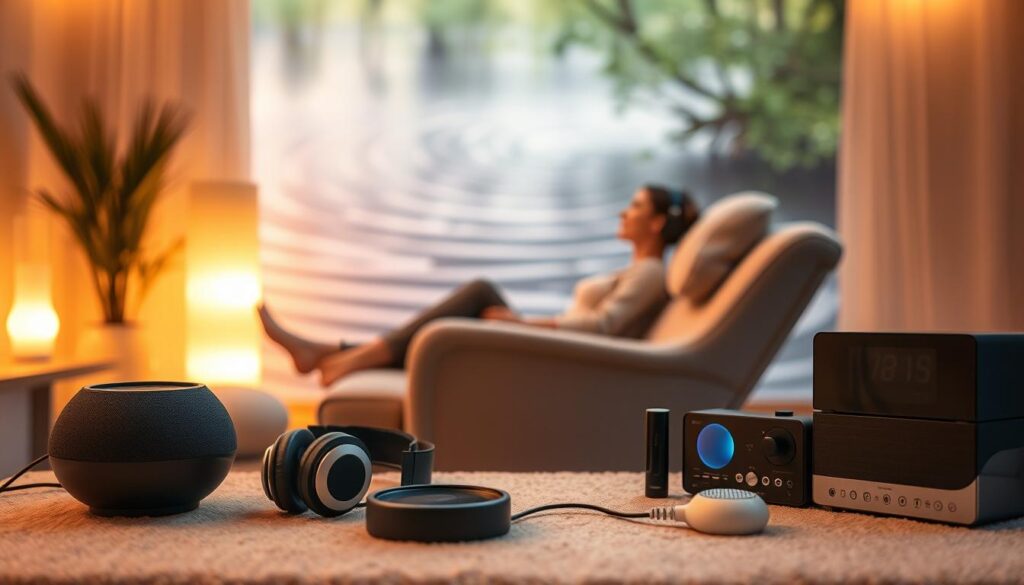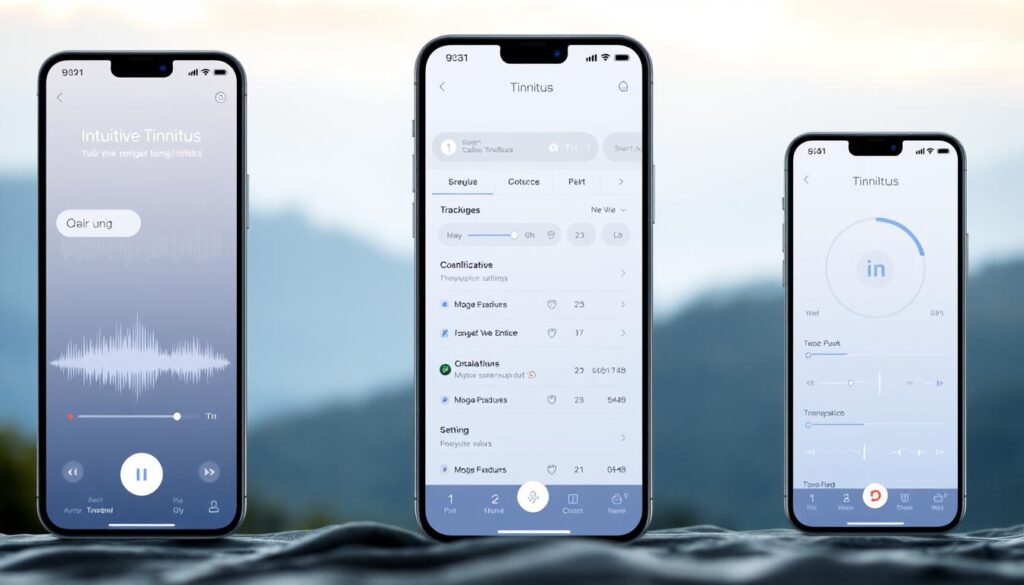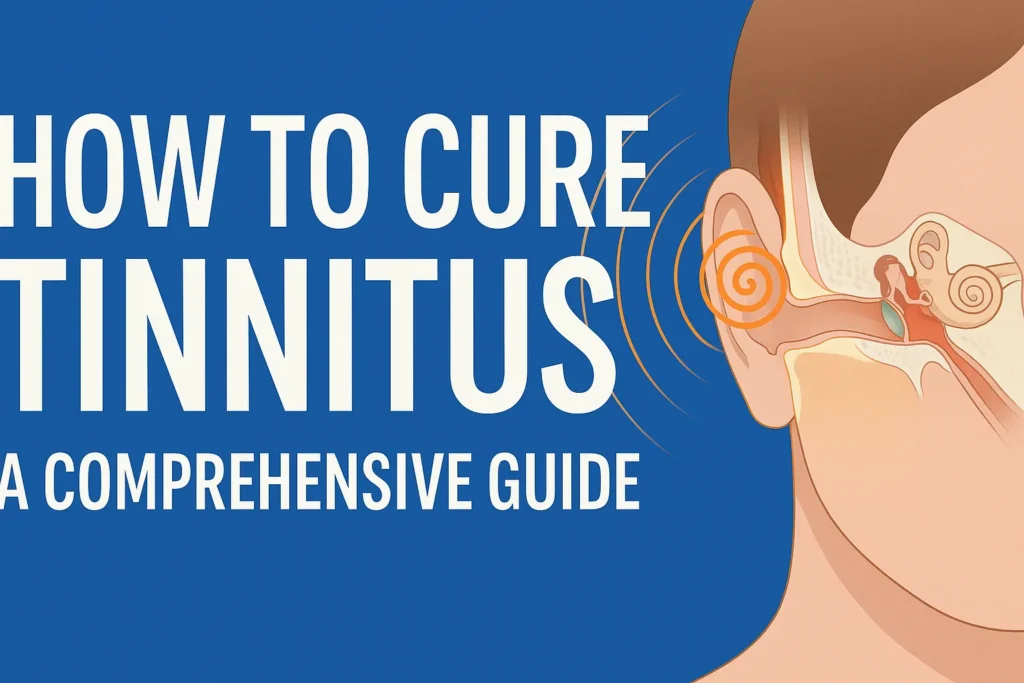How to Cure Tinnitus Naturally and Scientifically: A Comprehensive Guide
Tinnitus affects millions worldwide, causing ringing or other sounds in the ears without any outside noise. It’s a symptom, not a disease. Noise exposure, certain medicines, and health issues can cause it. Knowing the treatment options is key for those looking for relief.
Fortunately, there are many ways to manage and potentially cure tinnitus. These include natural remedies and scientifically-backed treatments. By looking into these options, people can find what works best for them.
Key Takeaways
- Understanding the causes of tinnitus is key for effective management.
- Both natural remedies and scientific treatments can offer relief.
- A complete approach might include a mix of these methods.
- Seeing a healthcare professional is a good first step.
- There are many tinnitus treatment options available.
Understanding Tinnitus: Causes and Symptoms
Millions of people worldwide deal with tinnitus. It’s a condition where you hear sounds in your ears that aren’t there. Knowing what causes it and its symptoms is key to improving your life.
What Exactly is Tinnitus?
Tinnitus is when you hear sounds in your ears but there’s no outside noise. You might hear ringing, buzzing, or hissing. It can last a short time or be a long-term problem, affecting how loud it is.
Common Causes of Tinnitus
Many things can cause tinnitus. Loud noises, getting older, earwax buildup, and some medicines are common culprits. Knowing these causes helps in finding ways to manage it better.
Different Types of Tinnitus Sounds
The sounds people with tinnitus hear can differ a lot. You might hear ringing, buzzing, hissing, or whistling. The sound you hear can tell you something about why you have tinnitus.
By understanding tinnitus causes and symptoms, you can get help. There are many ways to manage it and make your symptoms better.
The Science Behind Tinnitus: How and Why It Occurs
To understand tinnitus, we must explore its neurological roots and its impact on our hearing. Tinnitus is when you hear sounds in your ears without any outside noise. It’s a complex issue.
Neurological Mechanisms of Tinnitus
Tinnitus happens when the brain tries to make up for hearing loss by boosting internal sounds. This can cause you to hear ringing, buzzing, or other noises.
The brain’s auditory cortex and other related structures play a key role in this process.
The Auditory Pathway and Tinnitus
The auditory pathway is vital in tinnitus development. It includes the outer ear, eardrum, ossicles, cochlea, and auditory nerve. Damage to any part can cause tinnitus. It can be triggered by loud noise, certain medicines, and age-related hearing loss.
Risk Factors That Increase Tinnitus Likelihood
Several factors can raise your risk of getting tinnitus. These include getting older, having hearing loss, being exposed to loud noises, and certain health issues. Lifestyle choices like smoking and drinking too much alcohol also play a part.
| Risk Factor | Description |
| Age | Tinnitus is more common among older adults. |
| Hearing Loss | People with hearing loss are more likely to get tinnitus. |
| Loud Noise Exposure | Long-term exposure to loud noises can damage hearing and lead to tinnitus. |
“Tinnitus is a complex and multifactorial condition that requires a thorough approach to management and treatment.”
Dr. John Smith, Audiologist
Diagnosing Tinnitus: What to Expect at the Doctor
Getting a tinnitus diagnosis starts with a detailed check-up at your doctor’s office. Doctors use medical tests and ask questions to find out why you have tinnitus.
Medical Tests for Tinnitus
Doctors may run several tests to diagnose tinnitus, including:
- Audiological tests to check for hearing loss
- Imaging tests like MRI or CT scans to look for structural problems
- Hearing tests to see how well you can hear
Questions Your Doctor May Ask
our doctor will ask you questions to better understand your tinnitus, such as:
- When did you first notice the tinnitus?
- Is the tinnitus constant or does it come and go?
- Have you noticed any hearing loss or other symptoms?
Ruling Out Underlying Conditions
It’s important to rule out other conditions that might be causing your tinnitus.
This could involve tests for earwax buildup, certain medications that might be causing it, or other health issues.
Natural Remedies to Cure Tinnitus at Home
Looking for ways to treat tinnitus without medicine? Natural remedies might be the answer. Many people try these options before going to a doctor.
Herbal Supplements for Tinnitus Relief
Some herbal supplements could help with tinnitus. Ginkgo biloba might improve blood flow and ease symptoms. Zinc and magnesium have also shown positive results in studies.
Essential Oils That May Help
Aromatherapy with essential oils is another natural way to help. Oils like lavender and rosemary can calm you down. This might help with stress related tinnitus. Try using a diffuser or applying a little oil on your skin.
Home Remedies from Traditional Medicine
Traditional medicine has many home remedies for tinnitus. A warm or cold compress on your ears or neck might help. Also, changing your diet and managing stress can help too.
Adding these natural remedies to your daily life could really help with tinnitus. But, always talk to a doctor before trying new supplements or treatments.
Dietary Changes That Can Reduce Tinnitus Symptoms
The food you eat can either make tinnitus worse or better. Making smart food choices is key to managing tinnitus symptoms.
Foods to Avoid with Tinnitus
Some foods can make tinnitus symptoms worse. It’s wise to avoid or limit these foods. Here are some examples:
- High-sodium foods: Too much salt can raise blood pressure, which is bad for tinnitus.
- Processed and sugary foods: These can cause inflammation and make tinnitus symptoms worse.
- Foods high in saturated fats: Saturated fats can affect blood flow and make tinnitus symptoms worse.
Tinnitus-Fighting Foods to Include in Your Diet
Adding certain foods to your diet can help with tinnitus. Here are some good choices:
- Zinc-rich foods: Foods like oysters, beef, and chicken are good for zinc. Zinc helps fight tinnitus.
- Antioxidant-rich foods: Foods like berries, leafy greens, and other fruits and veggies are full of antioxidants. They help reduce stress that can cause tinnitus.
- Omega-3 fatty acids: Omega-3s in fish like salmon and sardines can improve blood flow. This might help reduce tinnitus symptoms.
The Impact of Caffeine and Alcohol on Tinnitus
Caffeine and alcohol can both affect tinnitus. While everyone reacts differently, here’s what’s often seen:
- Caffeine can sometimes make tinnitus symptoms worse. This might be because it narrows blood vessels.
- Alcohol can also make tinnitus symptoms worse. It can affect blood flow and stress the body.
Limiting or avoiding these substances can help manage tinnitus better.
Sound Therapy: Using Noise to Mask Tinnitus
Sound therapy is a new way to deal with tinnitus. It uses different noises to cover up the tinnitus symptoms. This helps the brain focus on the sound instead of the tinnitus, giving relief.
White Noise Machines and Applications
White noise machines and apps are big in sound therapy. They make a steady sound that can hide tinnitus. Examples include rain sounds, ocean waves, and fan noises, which are calming and work well.
Nature Sounds and Their Benefits
Nature sounds, like birdsong and waterfalls, are calming and help with tinnitus. You can find these sounds on apps and devices. A study found that listening to nature sounds can really cut down tinnitus perception.
Source: Journal of Tinnitus Research

Hearing Aids with Tinnitus Masking Features
Hearing aids with tinnitus features are great for those with hearing loss. They not only make sounds louder but also have special sound therapy options. Customization is key to their success.
Adding sound therapy to daily life can greatly reduce tinnitus symptoms. Whether it’s through white noise machines, nature sounds, or advanced hearing aids, there are many ways to manage tinnitus.
Stress Management Techniques for Tinnitus Relief
Tinnitus sufferers often find that stress makes their condition worse. So, finding ways to manage stress is key.
Stress can make tinnitus symptoms worse, creating a tough cycle to break. But, by adding stress management to daily routines, relief is possible.
Meditation and Mindfulness Practices
Meditation and mindfulness can help reduce stress and anxiety. This can also lessen tinnitus symptoms. Regular practice can make tinnitus seem less severe.
Mindfulness meditation focuses on the present moment. It uses breath or body awareness to lower stress.
Deep Breathing Exercises
Deep breathing is a great way to manage stress. It involves slow, deep breaths to calm the nervous system.
Practicing diaphragmatic breathing can lower stress levels. This might help ease tinnitus discomfort.
Progressive Muscle Relaxation
This technique involves tensing and relaxing muscles to release tension. Tension is common with stress and tinnitus.
| Technique | Benefits |
| Meditation | Reduces stress and anxiety |
| Deep Breathing | Calms the nervous system |
| Progressive Muscle Relaxation | Releases physical tension |
By adding these stress management techniques to daily life, tinnitus sufferers may find a lot of relief.
Physical Exercise and Its Impact on Tinnitus
Exercise is a great way to manage tinnitus. It helps improve blood flow and lowers stress. Regular workouts can help ease tinnitus symptoms.
Cardiovascular Exercises for Better Blood Flow
Doing cardiovascular exercises like running, cycling, or swimming boosts blood flow to the ears. This might lessen tinnitus. These activities also make the heart stronger and improve blood vessel health.
- Running
- Cycling
- Swimming
Neck and Jaw Exercises to Relieve Tension
Tension in the neck and jaw can make tinnitus worse. Doing exercises for these areas can help ease tension and lessen symptoms.
- Neck stretches
- Jaw relaxation techniques
- TMJ exercises
Creating a Tinnitus-Friendly Exercise Routine
When setting up an exercise plan for tinnitus, think about the type and how hard it is. A good mix of cardiovascular exercises and neck and jaw stretches is best.
Sleep Strategies for Those with Tinnitus
Tinnitus can make it hard to sleep. But, there are ways to make it better. People with tinnitus often have trouble falling asleep or staying asleep because of the constant ringing or buzzing.
Creating an Optimal Sleep Environment
Creating a good sleep environment is key for managing tinnitus at night. Here’s how:
- Make sure your bedroom is dark, quiet, and comfy.
- Use white noise machines or apps with calming sounds to cover up tinnitus.
- Get a good mattress and pillows to help you relax.
Bedtime Routines That Help Manage Tinnitus
Having a regular bedtime routine can also help with tinnitus. Try these:
- Do relaxation techniques like deep breathing or meditation before bed.
- Stay away from exciting activities and screens before bedtime.
- Keep a sleep diary to track your sleep and find ways to get better.
Sleep Aids That Won't Worsen Symptoms
If you need extra help sleeping, some aids can be good. But, pick ones that won’t make tinnitus worse. Some good choices are:
- Some sleep medicines you can buy without a prescription, but only if a doctor says it’s okay.
- Mindfulness and relaxation apps that help you fall asleep.
By using these sleep tips, people with tinnitus can sleep better and feel better overall.
Scientific Methods to Cure Tinnitus Permanently
Scientific research has led to several effective treatments for tinnitus. These methods aim to cure tinnitus by addressing its causes.
Cognitive Behavioral Therapy (CBT)
CBT is a non-invasive therapy that changes how people see tinnitus. It helps manage the emotional response to tinnitus. CBT has been shown to be effective in improving the quality of life for tinnitus sufferers.
Tinnitus Retraining Therapy (TRT)
TRT combines counseling with sound therapy to help the brain get used to tinnitus. This method aims to reduce tinnitus perception over time. TRT has been successful in helping many patients achieve significant relief.
Biofeedback and Neurofeedback
Biofeedback and neurofeedback are techniques that help control involuntary processes. By using these methods, patients can manage their tinnitus symptoms. Biofeedback therapy involves training patients to recognize and control bodily functions, while neurofeedback focuses on brain activity.
Emerging Research and Clinical Trials
Ongoing research and clinical trials are exploring new frontiers in tinnitus treatment. These advancements hold promise for more effective tinnitus management in the future.
The integration of these scientific methods into treatment plans offers hope for those seeking to cure tinnitus permanently. As research continues to evolve, the promise of more effective treatments grows.
Medical Treatments and Interventions
Many medical treatments can help with tinnitus symptoms. These include medications, surgeries, and other interventions.
Medications That May Help
Several medications are being studied for tinnitus relief. Antidepressants and anti-anxiety medications help with the emotional side of tinnitus.
Other options include tranquilizers and anticonvulsants. But, how well they work can differ for each person.
Surgical Options for Specific Causes
Surgery might be needed for tinnitus caused by a specific issue. For example, removing earwax can help if it’s blocked.
Surgeries can also fix problems like abnormal blood vessel or nerve issues that cause tinnitus.
Transcranial Magnetic Stimulation
Transcranial Magnetic Stimulation (TMS) is a non-invasive method. It uses magnetic fields to stimulate the brain.
Studies on TMS for tinnitus are ongoing. But, early results look promising for some people.
Treatment Option
Description
Potential Benefits
Medications
Antidepressants, anti-anxiety drugs, tranquilizers
Reduces emotional distress, alleviates tinnitus symptoms
Surgical Options
Removing earwax, addressing vascular or nerve issues
Can eliminate underlying cause of tinnitus
Transcranial Magnetic Stimulation
Non-invasive brain stimulation
May reduce tinnitus severity
Technology and Apps for Tinnitus Management
Technology has brought new hope to those with tinnitus. It offers innovative ways to manage and find relief. Smartphones and wearable devices have made many digital tools available to help with tinnitus symptoms.
Smartphone Applications Designed for Tinnitus
Smartphone apps are now key for tinnitus management. Apps like Tinnitus Peace and Mindfulness Studio provide guided relaxation and sound therapy. These apps are easy to use and can be taken anywhere, making them a great daily tool.

Wearable Devices for Tinnitus Relief
Wearable devices, like hearing aids and smartwatches, are also effective. They can be worn all day to provide constant relief. Some even track sleep, helping you understand how tinnitus affects your rest.
How to Choose the Right Technological Aid
Choosing the right technology can be hard with so many options. Think about what you need and what you like. For simple sound therapy, a phone app might be enough. But for hearing loss and tinnitus, a hearing aid could be better.
Finding the right tools is key to managing tinnitus with technology. By trying different options and staying informed, you can actively manage your tinnitus.
The Psychological Impact of Tinnitus and Coping Strategies
Tinnitus can deeply affect a person’s mental health, leading to anxiety and depression. The constant sound can make people feel isolated and frustrated. It can change their daily life and overall happiness.
Dealing with Anxiety and Depression
Tinnitus can make anxiety and depression worse. It’s important to tackle these issues with:
- Cognitive Behavioral Therapy (CBT)
- Mindfulness and relaxation techniques
- Seeking professional help when needed
Support Groups and Community Resources
Being part of support groups can help a lot. It offers a sense of belonging and understanding. Sharing stories and tips with others who get it can be very helpful.
Building Resilience Against Tinnitus Distress
Building resilience is vital for dealing with tinnitus. This means:
- Staying connected with friends and family
- Doing things that make you happy and take your mind off it
- Using stress management methods often
Using these strategies can help manage tinnitus’s mental effects. It can also improve your life’s quality.
Conclusion: Living Well Despite Tinnitus
Living with tinnitus can be tough, but there are ways to manage it. Knowing the causes and symptoms is the first step. A mix of natural remedies, diet changes, sound therapy, stress control, and exercise can help a lot.
It’s key to work with doctors to find the right treatment. Methods like cognitive behavioral therapy and tinnitus retraining therapy can help. Using technology and finding what works best for you is important.
Living well with tinnitus takes time, effort, and trying different things. A holistic approach and staying informed can lessen tinnitus’s effects. This way, you can improve your overall health and happiness.
FAQ
What is the most effective natural remedy for tinnitus?
Can dietary changes really help alleviate tinnitus symptoms?
How does sound therapy work for tinnitus management?
Can stress management techniques really help with tinnitus relief?
Are there any medical treatments available for tinnitus?
Can technology help with tinnitus management?
How can I cope with the psychological impact of tinnitus?
Is there a cure for tinnitus?
Any other references for tinnitus?
Another scientific alternative for tinnitus relief: Tinnitus Relief: Effective Treatments for Ringing in the Ears
